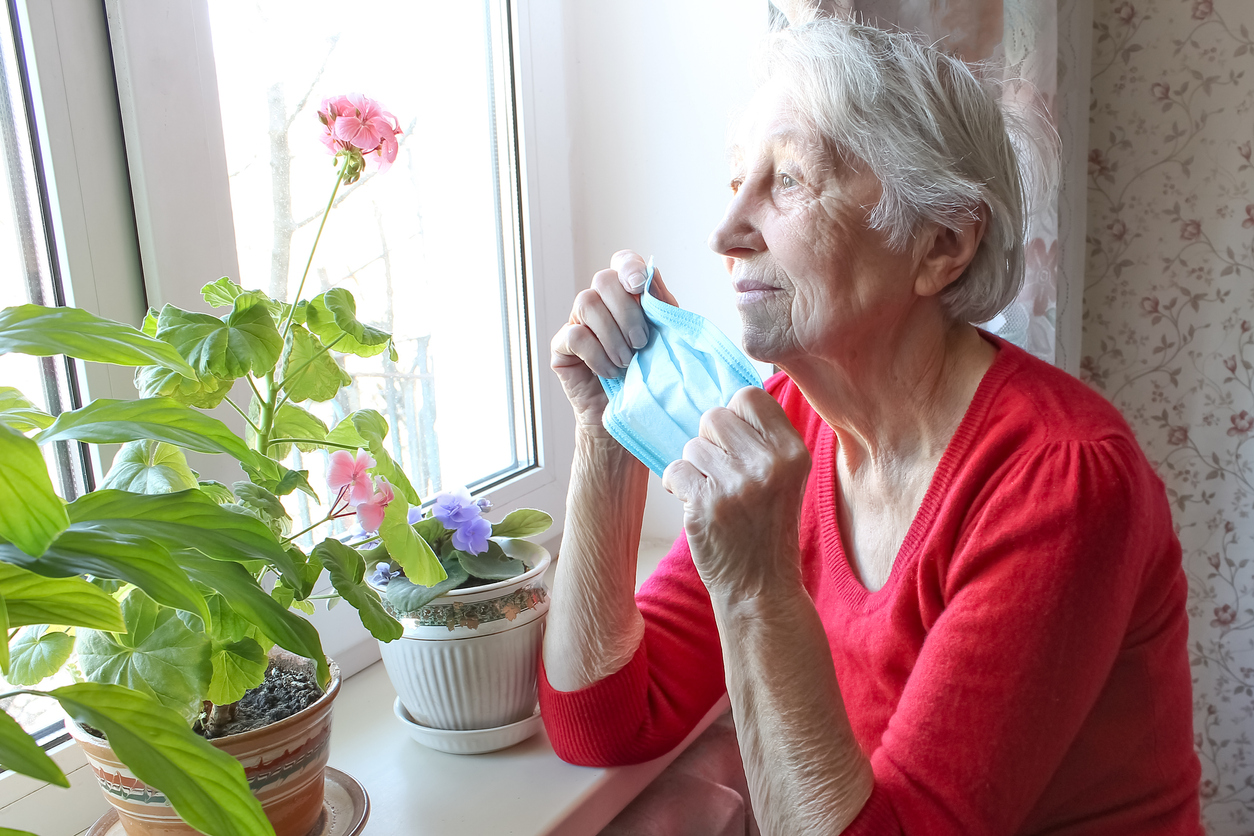After more than a year of restricted activities and minimal contact with loved ones, COVID-19 isolation has taken its toll on seniors. Although many American seniors are fully vaccinated against COVID-19, the pandemic has left indelible scars on this vulnerable population. Moreover, so many routines — those that seniors once relied upon for social contact — have changed.
Consider the differences in work and worship services, for example.
Work/Life Changes Fueling Cases of COVID-19 Isolation Among Seniors
As the pandemic comes to a close, roughly one-third of all U.S. employees will continue to work from home. Meanwhile, for those who work in conventional workspaces, new routines have become the status quo. Many of us now:
- Apply socially distant behaviors, as hugs and handshakes cause anxiety
- Wear face coverings, which can cause even more unease among seniors with dementia
- Behave in a “mysophobic/germophobic” manner, with a constant need to disinfect and sanitize surfaces
In reality, for many seniors, going on errands — like a trip to the pharmacy — remains an experience that’s strange at best and terrifying at worst. Because of their heightened anxiety, many prefer to stay home. This further exacerbates their feelings of loneliness and isolation.
Prayer and Worship Services Aren’t What They Used To Be
Indeed, many places of worship have reduced capacity.
- Here in NYC, churches and temples must operate at 50% capacity now that we’re in Phase Four of reopening.
- Choir singers must stay at least 12 feet apart, which changes the look and sound of a service.
Attendees must still practice some social distancing during services. Ultimately, many seniors miss the feelings of community and fellowship they used to enjoy. They often worry about contracting the virus, even after receiving full doses of the vaccine. As a result, some will stay home rather than risk infection at a service that “doesn’t feel right.”
The above are only two examples of how the world has changed, but they are significant causes of loneliness and isolation among our seniors. Below, we talk about ways to combat these issues.
What’s the Difference Between Loneliness and Social Isolation?
The US Department of Health and Human Services (HHS) National Institute on Aging website (NIH) explains that social isolation and loneliness are different but related.
- Loneliness is a distressing feeling of being separated or alone.
- Social isolation is a lack of social contacts.
- One can live alone but not feel lonely or socially isolated. Meanwhile, another may feel lonely among others.
Older adults are at higher risk of loneliness and social isolation, thanks to changes in their health and mobility. They may struggle with physical issues that come with aging, like hearing and vision problems, memory loss, disabilities, ambulatory struggles (difficulty walking), and the loss of former friends.
Loneliness and isolation can have debilitating physical effects:
- Reduced appetite, weight loss
- Overeating, weight gain
- Trouble sleeping
- High blood pressure
- Cognitive decline
- Dementia and exacerbated Alzheimer’s disease
- Anxiety
- A weakened immune system
Seniors who live alone and suffer from cognitive issues like dementia or Alzheimer’s may face the most risks.
Tips for Seniors Who Live Alone
If your family member has dementia and lives alone, try to enlist the help of friends, neighbors, and professional caregivers.
The National Institutes of Health suggests that you:
- Speak to a person you trust and ask them to visit your loved one in person and act as an emergency contact.
- Help your loved one connect with others through social media, phone calls, and online support groups.
- Encourage your loved one to talk with others who share common interests.
- Seek professional help from a caregiver with specialized training.
At David York Agency, our mission is to provide outstanding care for the aging population of New York. We offer various types of in-home health care, including specialized care for dementia and Alzheimer’s patients and those with mild cognitive impairment.
Our services go beyond nutrition and medication management. We strive to be sure your loved ones are getting the social contact they need to help them overcome feelings of isolation and loneliness.
David York Agency Understands the Consequences of COVID-19 Isolation
If the above information about COVID-19 isolation has been useful, check out David York Agency’s blog for more articles about senior care in the Bronx.
David York Agency understands the challenges of caregiving and is willing to provide all the support you need.
If you’d like more information about David York Agency’s qualified, compassionate caregivers, contact us at 718.376.7755. A free phone consultation can help you decide what services might be best. If you’d like to hear more from us, please like us on Facebook or follow us on Twitter or LinkedIn.
David York Agency Home Healthcare remains committed to providing personalized care for your loved one. If you have questions about our services, please contact us. We can help you through the difficult times and give you the break you deserve!







